Reflecting on Teamwork Experiences: Youth Development Assignment
VerifiedAdded on 2023/01/13
|9
|2078
|76
Report
AI Summary
This assignment is a reflective report on a student's experience with teamwork, specifically within the context of youth development. The report details the student's participation in a group project, describing the group's composition, the assigned task of creating a presentation on teamwork for youth, and the student's individual role. The reflection explores the student's feelings, including confidence, nervousness, and the value of diverse perspectives. The evaluation section analyzes both the positive aspects, such as effective communication and task delegation, and the negative aspects, such as time constraints and lack of leadership. The conclusion emphasizes the importance of teamwork, task delegation, and leadership, and suggests improvements for future group projects, including the selection of a team leader and the development of time management skills. The report references Gibbs' reflective cycle and other relevant literature to support the analysis and recommendations. Finally, the report includes an action plan to improve future group work experiences.

1
Teamwork for Youth
By
Course
Date
Teamwork for Youth
By
Course
Date
Paraphrase This Document
Need a fresh take? Get an instant paraphrase of this document with our AI Paraphraser
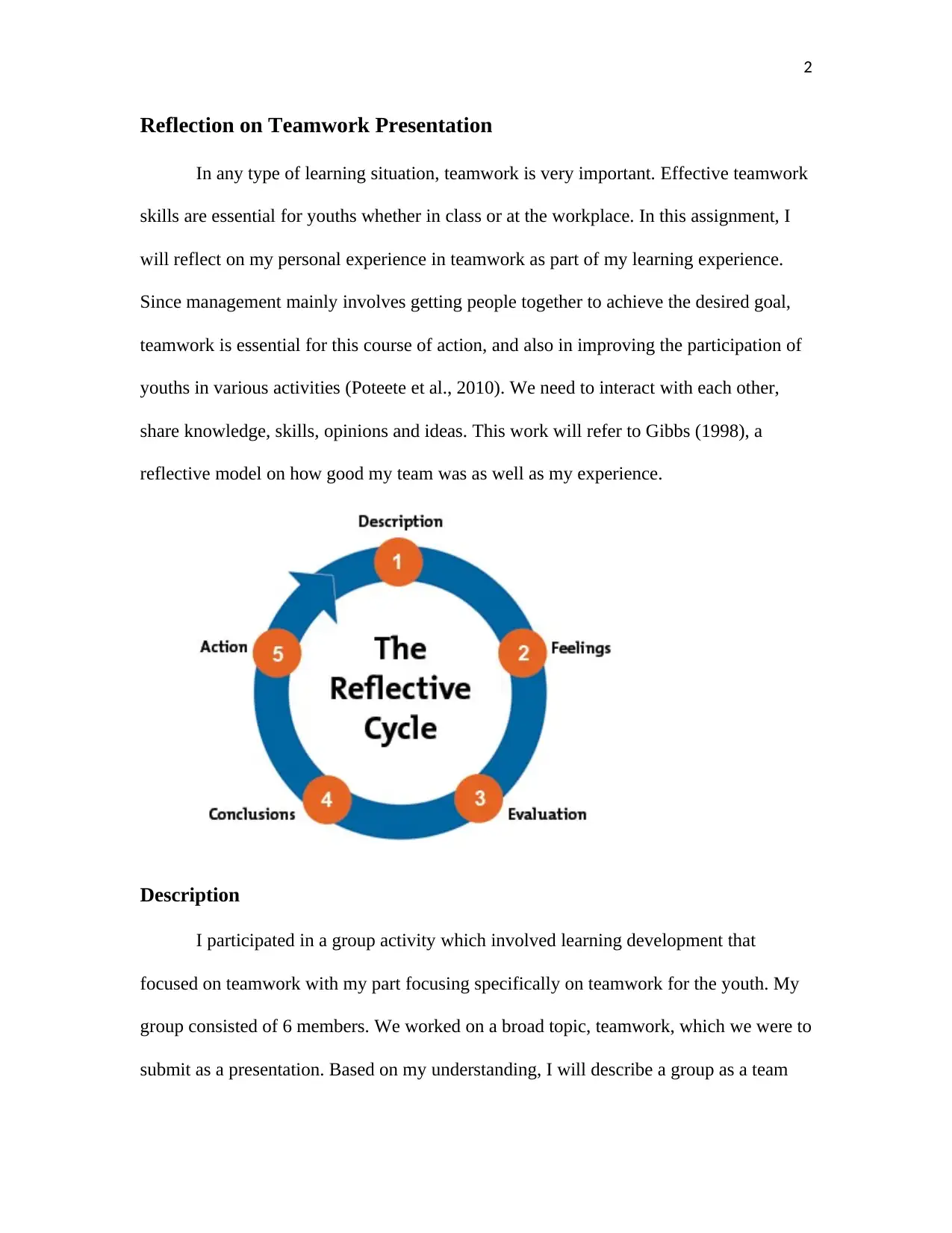
2
Reflection on Teamwork Presentation
In any type of learning situation, teamwork is very important. Effective teamwork
skills are essential for youths whether in class or at the workplace. In this assignment, I
will reflect on my personal experience in teamwork as part of my learning experience.
Since management mainly involves getting people together to achieve the desired goal,
teamwork is essential for this course of action, and also in improving the participation of
youths in various activities (Poteete et al., 2010). We need to interact with each other,
share knowledge, skills, opinions and ideas. This work will refer to Gibbs (1998), a
reflective model on how good my team was as well as my experience.
Description
I participated in a group activity which involved learning development that
focused on teamwork with my part focusing specifically on teamwork for the youth. My
group consisted of 6 members. We worked on a broad topic, teamwork, which we were to
submit as a presentation. Based on my understanding, I will describe a group as a team
Reflection on Teamwork Presentation
In any type of learning situation, teamwork is very important. Effective teamwork
skills are essential for youths whether in class or at the workplace. In this assignment, I
will reflect on my personal experience in teamwork as part of my learning experience.
Since management mainly involves getting people together to achieve the desired goal,
teamwork is essential for this course of action, and also in improving the participation of
youths in various activities (Poteete et al., 2010). We need to interact with each other,
share knowledge, skills, opinions and ideas. This work will refer to Gibbs (1998), a
reflective model on how good my team was as well as my experience.
Description
I participated in a group activity which involved learning development that
focused on teamwork with my part focusing specifically on teamwork for the youth. My
group consisted of 6 members. We worked on a broad topic, teamwork, which we were to
submit as a presentation. Based on my understanding, I will describe a group as a team
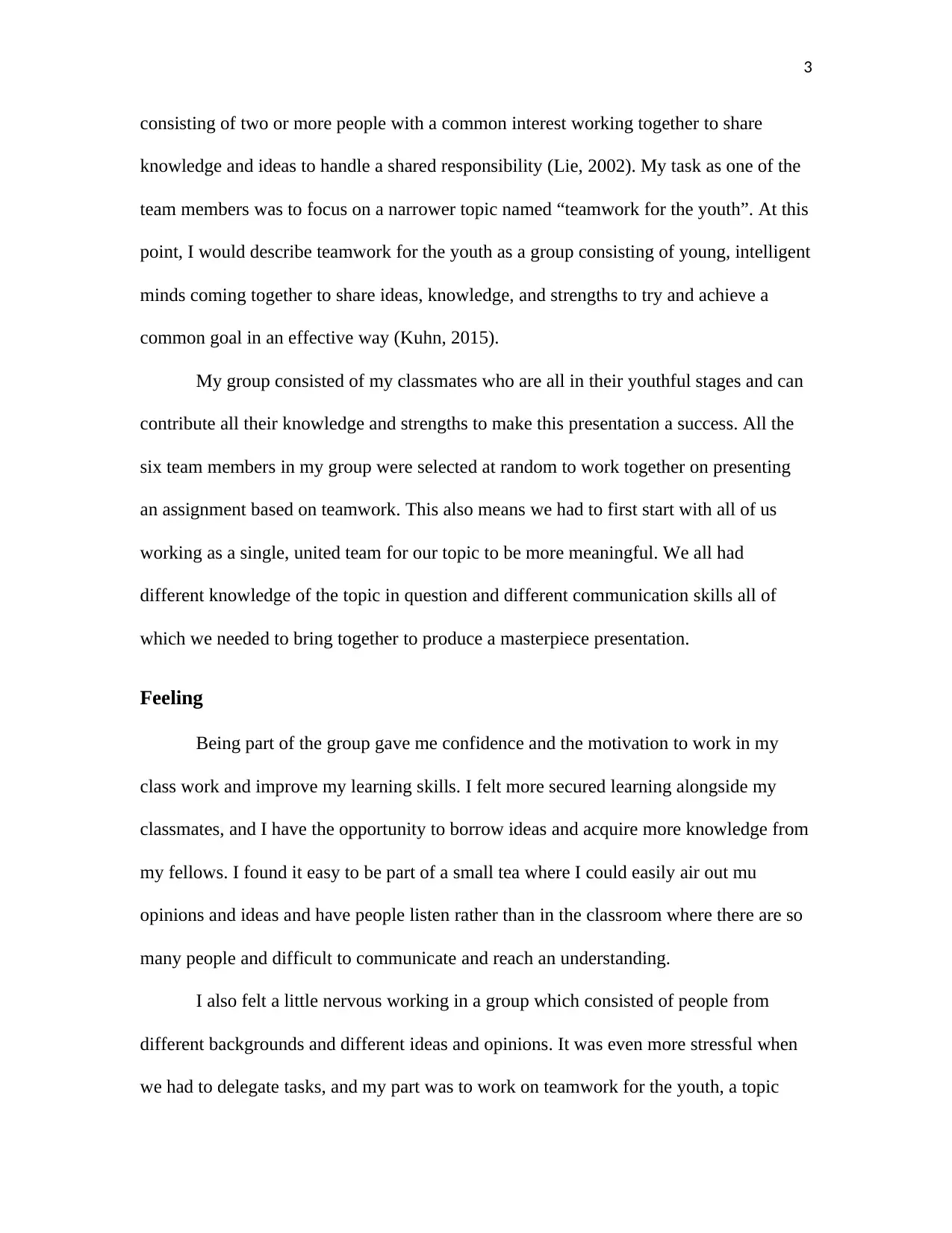
3
consisting of two or more people with a common interest working together to share
knowledge and ideas to handle a shared responsibility (Lie, 2002). My task as one of the
team members was to focus on a narrower topic named “teamwork for the youth”. At this
point, I would describe teamwork for the youth as a group consisting of young, intelligent
minds coming together to share ideas, knowledge, and strengths to try and achieve a
common goal in an effective way (Kuhn, 2015).
My group consisted of my classmates who are all in their youthful stages and can
contribute all their knowledge and strengths to make this presentation a success. All the
six team members in my group were selected at random to work together on presenting
an assignment based on teamwork. This also means we had to first start with all of us
working as a single, united team for our topic to be more meaningful. We all had
different knowledge of the topic in question and different communication skills all of
which we needed to bring together to produce a masterpiece presentation.
Feeling
Being part of the group gave me confidence and the motivation to work in my
class work and improve my learning skills. I felt more secured learning alongside my
classmates, and I have the opportunity to borrow ideas and acquire more knowledge from
my fellows. I found it easy to be part of a small tea where I could easily air out mu
opinions and ideas and have people listen rather than in the classroom where there are so
many people and difficult to communicate and reach an understanding.
I also felt a little nervous working in a group which consisted of people from
different backgrounds and different ideas and opinions. It was even more stressful when
we had to delegate tasks, and my part was to work on teamwork for the youth, a topic
consisting of two or more people with a common interest working together to share
knowledge and ideas to handle a shared responsibility (Lie, 2002). My task as one of the
team members was to focus on a narrower topic named “teamwork for the youth”. At this
point, I would describe teamwork for the youth as a group consisting of young, intelligent
minds coming together to share ideas, knowledge, and strengths to try and achieve a
common goal in an effective way (Kuhn, 2015).
My group consisted of my classmates who are all in their youthful stages and can
contribute all their knowledge and strengths to make this presentation a success. All the
six team members in my group were selected at random to work together on presenting
an assignment based on teamwork. This also means we had to first start with all of us
working as a single, united team for our topic to be more meaningful. We all had
different knowledge of the topic in question and different communication skills all of
which we needed to bring together to produce a masterpiece presentation.
Feeling
Being part of the group gave me confidence and the motivation to work in my
class work and improve my learning skills. I felt more secured learning alongside my
classmates, and I have the opportunity to borrow ideas and acquire more knowledge from
my fellows. I found it easy to be part of a small tea where I could easily air out mu
opinions and ideas and have people listen rather than in the classroom where there are so
many people and difficult to communicate and reach an understanding.
I also felt a little nervous working in a group which consisted of people from
different backgrounds and different ideas and opinions. It was even more stressful when
we had to delegate tasks, and my part was to work on teamwork for the youth, a topic
⊘ This is a preview!⊘
Do you want full access?
Subscribe today to unlock all pages.

Trusted by 1+ million students worldwide
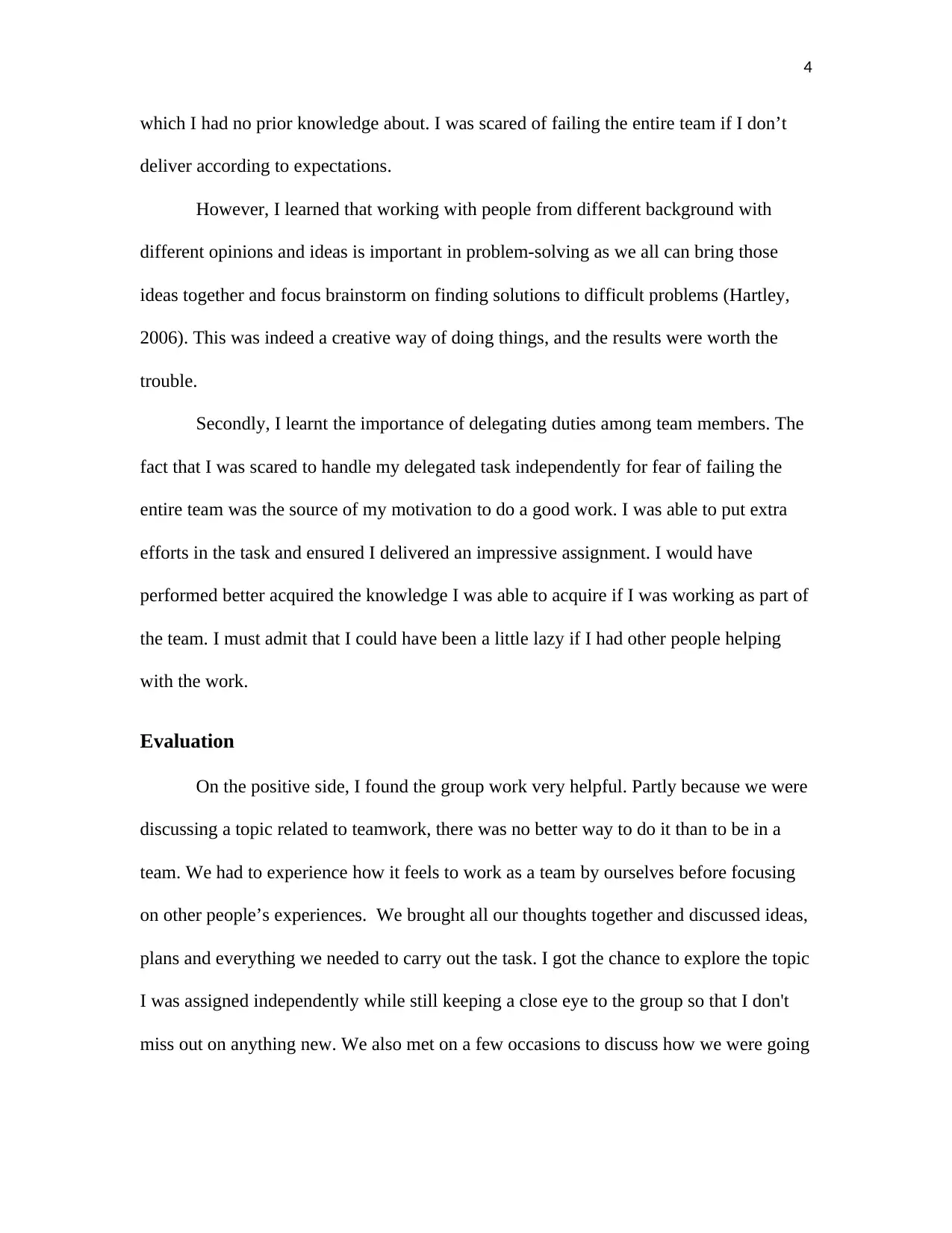
4
which I had no prior knowledge about. I was scared of failing the entire team if I don’t
deliver according to expectations.
However, I learned that working with people from different background with
different opinions and ideas is important in problem-solving as we all can bring those
ideas together and focus brainstorm on finding solutions to difficult problems (Hartley,
2006). This was indeed a creative way of doing things, and the results were worth the
trouble.
Secondly, I learnt the importance of delegating duties among team members. The
fact that I was scared to handle my delegated task independently for fear of failing the
entire team was the source of my motivation to do a good work. I was able to put extra
efforts in the task and ensured I delivered an impressive assignment. I would have
performed better acquired the knowledge I was able to acquire if I was working as part of
the team. I must admit that I could have been a little lazy if I had other people helping
with the work.
Evaluation
On the positive side, I found the group work very helpful. Partly because we were
discussing a topic related to teamwork, there was no better way to do it than to be in a
team. We had to experience how it feels to work as a team by ourselves before focusing
on other people’s experiences. We brought all our thoughts together and discussed ideas,
plans and everything we needed to carry out the task. I got the chance to explore the topic
I was assigned independently while still keeping a close eye to the group so that I don't
miss out on anything new. We also met on a few occasions to discuss how we were going
which I had no prior knowledge about. I was scared of failing the entire team if I don’t
deliver according to expectations.
However, I learned that working with people from different background with
different opinions and ideas is important in problem-solving as we all can bring those
ideas together and focus brainstorm on finding solutions to difficult problems (Hartley,
2006). This was indeed a creative way of doing things, and the results were worth the
trouble.
Secondly, I learnt the importance of delegating duties among team members. The
fact that I was scared to handle my delegated task independently for fear of failing the
entire team was the source of my motivation to do a good work. I was able to put extra
efforts in the task and ensured I delivered an impressive assignment. I would have
performed better acquired the knowledge I was able to acquire if I was working as part of
the team. I must admit that I could have been a little lazy if I had other people helping
with the work.
Evaluation
On the positive side, I found the group work very helpful. Partly because we were
discussing a topic related to teamwork, there was no better way to do it than to be in a
team. We had to experience how it feels to work as a team by ourselves before focusing
on other people’s experiences. We brought all our thoughts together and discussed ideas,
plans and everything we needed to carry out the task. I got the chance to explore the topic
I was assigned independently while still keeping a close eye to the group so that I don't
miss out on anything new. We also met on a few occasions to discuss how we were going
Paraphrase This Document
Need a fresh take? Get an instant paraphrase of this document with our AI Paraphraser
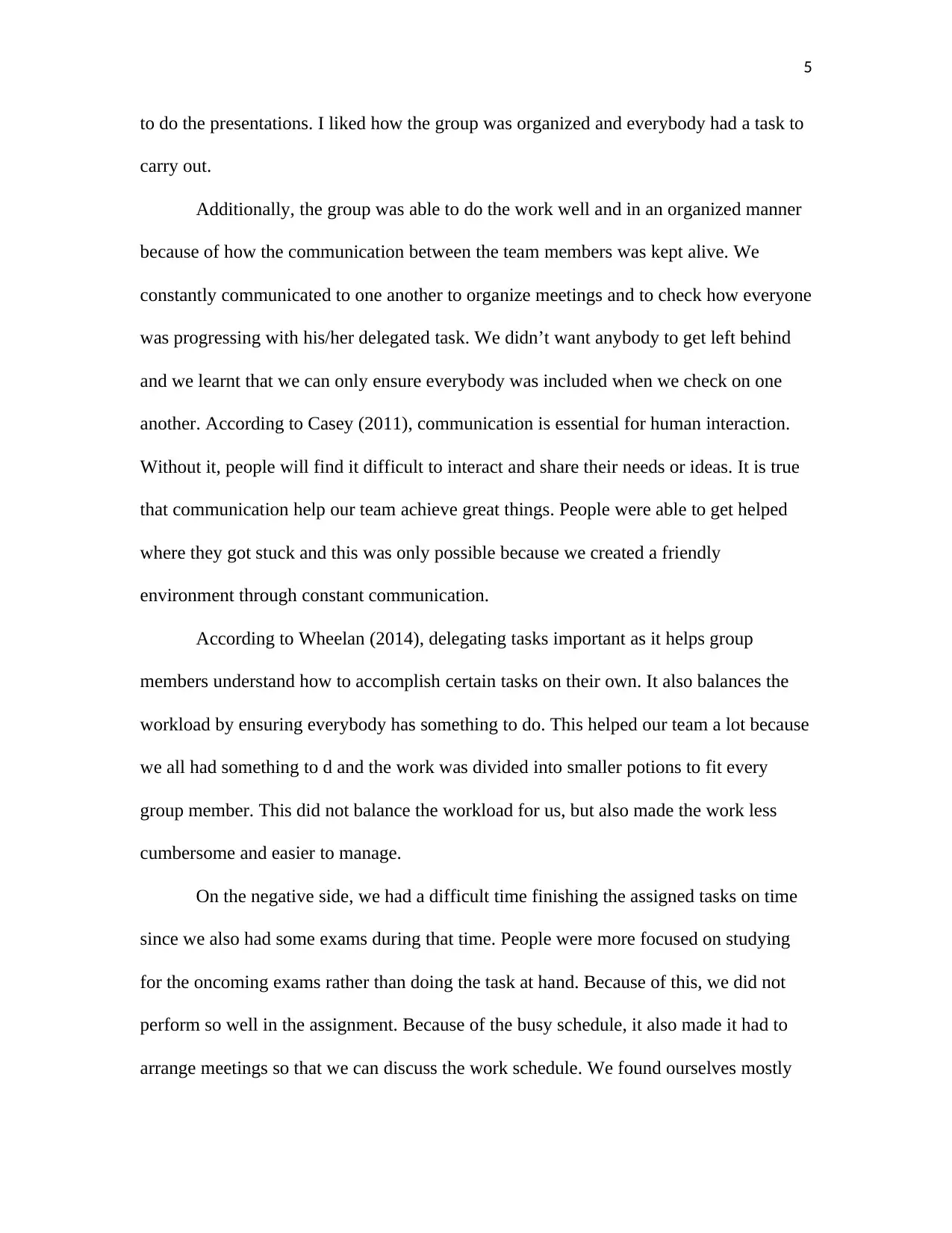
5
to do the presentations. I liked how the group was organized and everybody had a task to
carry out.
Additionally, the group was able to do the work well and in an organized manner
because of how the communication between the team members was kept alive. We
constantly communicated to one another to organize meetings and to check how everyone
was progressing with his/her delegated task. We didn’t want anybody to get left behind
and we learnt that we can only ensure everybody was included when we check on one
another. According to Casey (2011), communication is essential for human interaction.
Without it, people will find it difficult to interact and share their needs or ideas. It is true
that communication help our team achieve great things. People were able to get helped
where they got stuck and this was only possible because we created a friendly
environment through constant communication.
According to Wheelan (2014), delegating tasks important as it helps group
members understand how to accomplish certain tasks on their own. It also balances the
workload by ensuring everybody has something to do. This helped our team a lot because
we all had something to d and the work was divided into smaller potions to fit every
group member. This did not balance the workload for us, but also made the work less
cumbersome and easier to manage.
On the negative side, we had a difficult time finishing the assigned tasks on time
since we also had some exams during that time. People were more focused on studying
for the oncoming exams rather than doing the task at hand. Because of this, we did not
perform so well in the assignment. Because of the busy schedule, it also made it had to
arrange meetings so that we can discuss the work schedule. We found ourselves mostly
to do the presentations. I liked how the group was organized and everybody had a task to
carry out.
Additionally, the group was able to do the work well and in an organized manner
because of how the communication between the team members was kept alive. We
constantly communicated to one another to organize meetings and to check how everyone
was progressing with his/her delegated task. We didn’t want anybody to get left behind
and we learnt that we can only ensure everybody was included when we check on one
another. According to Casey (2011), communication is essential for human interaction.
Without it, people will find it difficult to interact and share their needs or ideas. It is true
that communication help our team achieve great things. People were able to get helped
where they got stuck and this was only possible because we created a friendly
environment through constant communication.
According to Wheelan (2014), delegating tasks important as it helps group
members understand how to accomplish certain tasks on their own. It also balances the
workload by ensuring everybody has something to do. This helped our team a lot because
we all had something to d and the work was divided into smaller potions to fit every
group member. This did not balance the workload for us, but also made the work less
cumbersome and easier to manage.
On the negative side, we had a difficult time finishing the assigned tasks on time
since we also had some exams during that time. People were more focused on studying
for the oncoming exams rather than doing the task at hand. Because of this, we did not
perform so well in the assignment. Because of the busy schedule, it also made it had to
arrange meetings so that we can discuss the work schedule. We found ourselves mostly
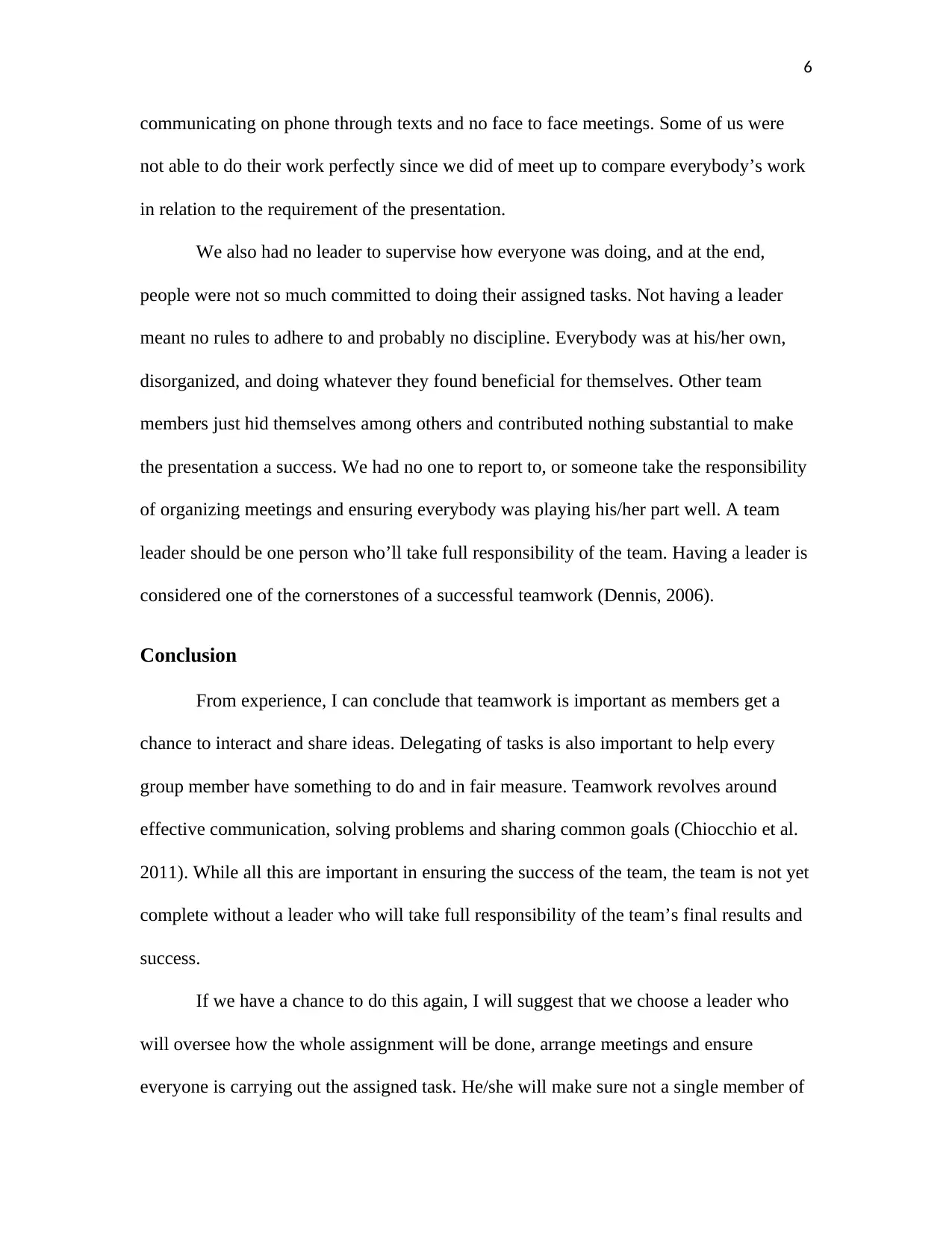
6
communicating on phone through texts and no face to face meetings. Some of us were
not able to do their work perfectly since we did of meet up to compare everybody’s work
in relation to the requirement of the presentation.
We also had no leader to supervise how everyone was doing, and at the end,
people were not so much committed to doing their assigned tasks. Not having a leader
meant no rules to adhere to and probably no discipline. Everybody was at his/her own,
disorganized, and doing whatever they found beneficial for themselves. Other team
members just hid themselves among others and contributed nothing substantial to make
the presentation a success. We had no one to report to, or someone take the responsibility
of organizing meetings and ensuring everybody was playing his/her part well. A team
leader should be one person who’ll take full responsibility of the team. Having a leader is
considered one of the cornerstones of a successful teamwork (Dennis, 2006).
Conclusion
From experience, I can conclude that teamwork is important as members get a
chance to interact and share ideas. Delegating of tasks is also important to help every
group member have something to do and in fair measure. Teamwork revolves around
effective communication, solving problems and sharing common goals (Chiocchio et al.
2011). While all this are important in ensuring the success of the team, the team is not yet
complete without a leader who will take full responsibility of the team’s final results and
success.
If we have a chance to do this again, I will suggest that we choose a leader who
will oversee how the whole assignment will be done, arrange meetings and ensure
everyone is carrying out the assigned task. He/she will make sure not a single member of
communicating on phone through texts and no face to face meetings. Some of us were
not able to do their work perfectly since we did of meet up to compare everybody’s work
in relation to the requirement of the presentation.
We also had no leader to supervise how everyone was doing, and at the end,
people were not so much committed to doing their assigned tasks. Not having a leader
meant no rules to adhere to and probably no discipline. Everybody was at his/her own,
disorganized, and doing whatever they found beneficial for themselves. Other team
members just hid themselves among others and contributed nothing substantial to make
the presentation a success. We had no one to report to, or someone take the responsibility
of organizing meetings and ensuring everybody was playing his/her part well. A team
leader should be one person who’ll take full responsibility of the team. Having a leader is
considered one of the cornerstones of a successful teamwork (Dennis, 2006).
Conclusion
From experience, I can conclude that teamwork is important as members get a
chance to interact and share ideas. Delegating of tasks is also important to help every
group member have something to do and in fair measure. Teamwork revolves around
effective communication, solving problems and sharing common goals (Chiocchio et al.
2011). While all this are important in ensuring the success of the team, the team is not yet
complete without a leader who will take full responsibility of the team’s final results and
success.
If we have a chance to do this again, I will suggest that we choose a leader who
will oversee how the whole assignment will be done, arrange meetings and ensure
everyone is carrying out the assigned task. He/she will make sure not a single member of
⊘ This is a preview!⊘
Do you want full access?
Subscribe today to unlock all pages.

Trusted by 1+ million students worldwide
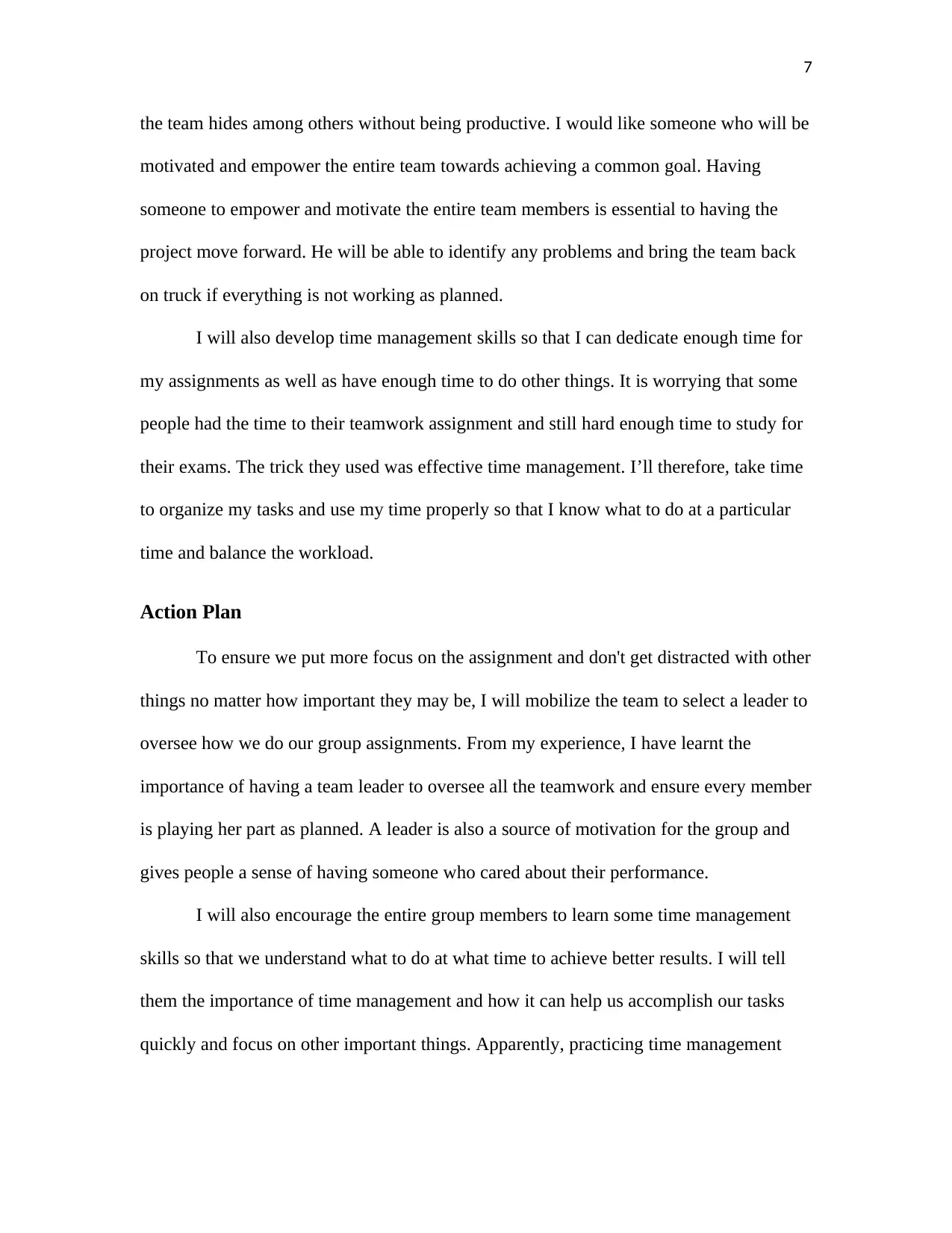
7
the team hides among others without being productive. I would like someone who will be
motivated and empower the entire team towards achieving a common goal. Having
someone to empower and motivate the entire team members is essential to having the
project move forward. He will be able to identify any problems and bring the team back
on truck if everything is not working as planned.
I will also develop time management skills so that I can dedicate enough time for
my assignments as well as have enough time to do other things. It is worrying that some
people had the time to their teamwork assignment and still hard enough time to study for
their exams. The trick they used was effective time management. I’ll therefore, take time
to organize my tasks and use my time properly so that I know what to do at a particular
time and balance the workload.
Action Plan
To ensure we put more focus on the assignment and don't get distracted with other
things no matter how important they may be, I will mobilize the team to select a leader to
oversee how we do our group assignments. From my experience, I have learnt the
importance of having a team leader to oversee all the teamwork and ensure every member
is playing her part as planned. A leader is also a source of motivation for the group and
gives people a sense of having someone who cared about their performance.
I will also encourage the entire group members to learn some time management
skills so that we understand what to do at what time to achieve better results. I will tell
them the importance of time management and how it can help us accomplish our tasks
quickly and focus on other important things. Apparently, practicing time management
the team hides among others without being productive. I would like someone who will be
motivated and empower the entire team towards achieving a common goal. Having
someone to empower and motivate the entire team members is essential to having the
project move forward. He will be able to identify any problems and bring the team back
on truck if everything is not working as planned.
I will also develop time management skills so that I can dedicate enough time for
my assignments as well as have enough time to do other things. It is worrying that some
people had the time to their teamwork assignment and still hard enough time to study for
their exams. The trick they used was effective time management. I’ll therefore, take time
to organize my tasks and use my time properly so that I know what to do at a particular
time and balance the workload.
Action Plan
To ensure we put more focus on the assignment and don't get distracted with other
things no matter how important they may be, I will mobilize the team to select a leader to
oversee how we do our group assignments. From my experience, I have learnt the
importance of having a team leader to oversee all the teamwork and ensure every member
is playing her part as planned. A leader is also a source of motivation for the group and
gives people a sense of having someone who cared about their performance.
I will also encourage the entire group members to learn some time management
skills so that we understand what to do at what time to achieve better results. I will tell
them the importance of time management and how it can help us accomplish our tasks
quickly and focus on other important things. Apparently, practicing time management
Paraphrase This Document
Need a fresh take? Get an instant paraphrase of this document with our AI Paraphraser

8
and getting everyone to be in a meeting or do their tasks on time also require the
interventions of a leader.
and getting everyone to be in a meeting or do their tasks on time also require the
interventions of a leader.
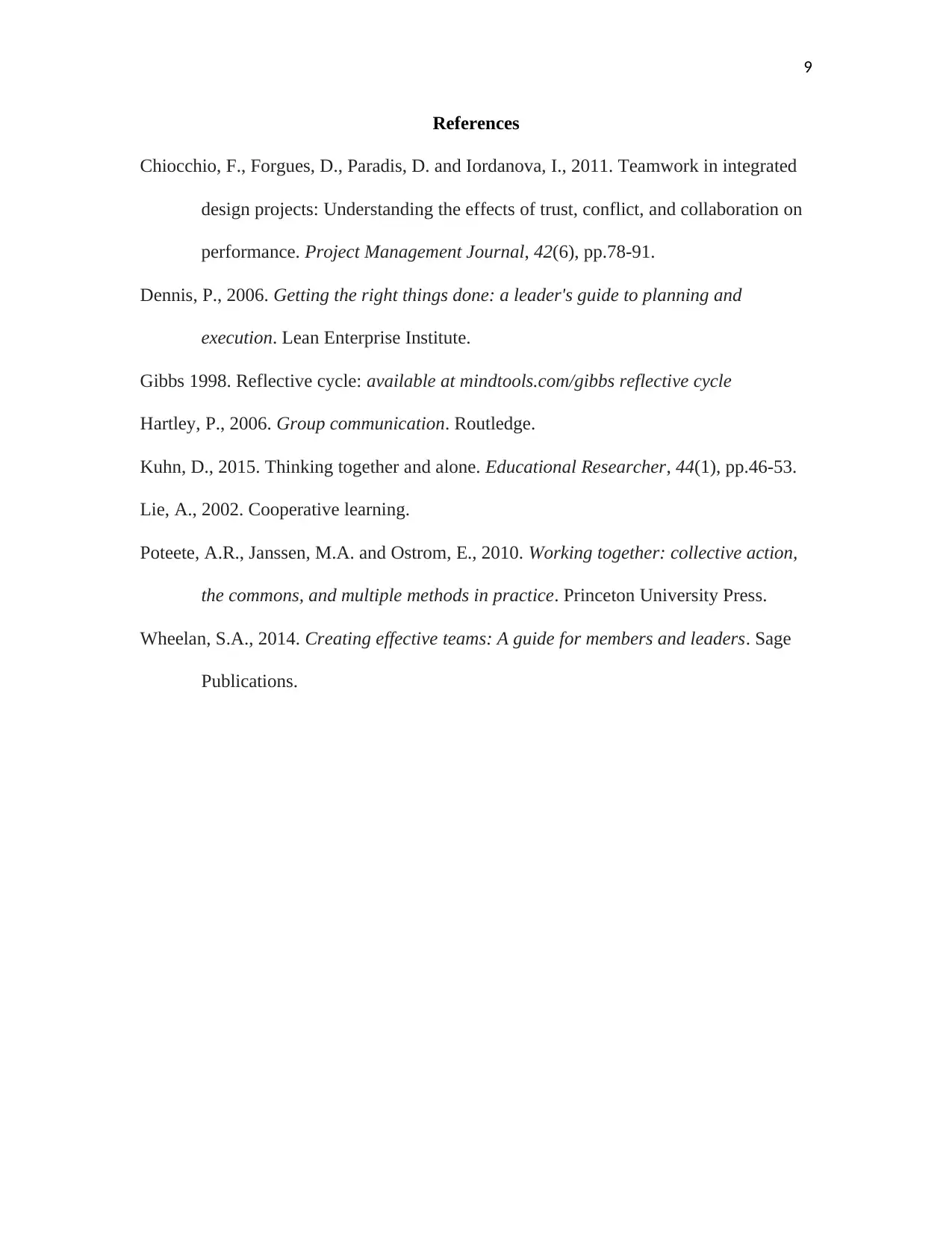
9
References
Chiocchio, F., Forgues, D., Paradis, D. and Iordanova, I., 2011. Teamwork in integrated
design projects: Understanding the effects of trust, conflict, and collaboration on
performance. Project Management Journal, 42(6), pp.78-91.
Dennis, P., 2006. Getting the right things done: a leader's guide to planning and
execution. Lean Enterprise Institute.
Gibbs 1998. Reflective cycle: available at mindtools.com/gibbs reflective cycle
Hartley, P., 2006. Group communication. Routledge.
Kuhn, D., 2015. Thinking together and alone. Educational Researcher, 44(1), pp.46-53.
Lie, A., 2002. Cooperative learning.
Poteete, A.R., Janssen, M.A. and Ostrom, E., 2010. Working together: collective action,
the commons, and multiple methods in practice. Princeton University Press.
Wheelan, S.A., 2014. Creating effective teams: A guide for members and leaders. Sage
Publications.
References
Chiocchio, F., Forgues, D., Paradis, D. and Iordanova, I., 2011. Teamwork in integrated
design projects: Understanding the effects of trust, conflict, and collaboration on
performance. Project Management Journal, 42(6), pp.78-91.
Dennis, P., 2006. Getting the right things done: a leader's guide to planning and
execution. Lean Enterprise Institute.
Gibbs 1998. Reflective cycle: available at mindtools.com/gibbs reflective cycle
Hartley, P., 2006. Group communication. Routledge.
Kuhn, D., 2015. Thinking together and alone. Educational Researcher, 44(1), pp.46-53.
Lie, A., 2002. Cooperative learning.
Poteete, A.R., Janssen, M.A. and Ostrom, E., 2010. Working together: collective action,
the commons, and multiple methods in practice. Princeton University Press.
Wheelan, S.A., 2014. Creating effective teams: A guide for members and leaders. Sage
Publications.
⊘ This is a preview!⊘
Do you want full access?
Subscribe today to unlock all pages.

Trusted by 1+ million students worldwide
1 out of 9
Related Documents
Your All-in-One AI-Powered Toolkit for Academic Success.
+13062052269
info@desklib.com
Available 24*7 on WhatsApp / Email
![[object Object]](/_next/static/media/star-bottom.7253800d.svg)
Unlock your academic potential
Copyright © 2020–2026 A2Z Services. All Rights Reserved. Developed and managed by ZUCOL.




